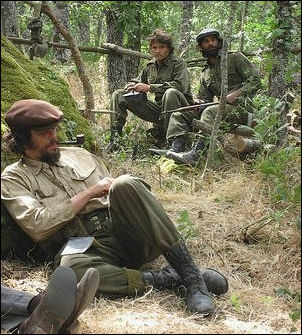The film takes up the life of Che Guevara ( 1928-67 ) in the middle, as he sails on a small ship with Fidel Castro to initiate a guerrila war agaist the Sandinista dictatorship in Cuba. Part 1 concludes with the defeat of the dictator and assumption of power by Castro. Che leaves for other revolutionary pastures in Latin America. The second half ( which I haven't seen yet ) deals with his unsuccessful efforts in Bolivia and his death.
Apart from questions of cinema ( my motive in investing time on this movie each of whose two parts is over two hours ) was to get to know something of the life and events surrounding this famous figure.
The line dividing true idealism and tyranny is nebulous. He proclaims in the film that the hallmark of a revolutionary is love, and a love for justice. At the same time he is committed, as a communist, to violence and guerrila war as a means for fighting oppression. It is a view in which love and murder are reconciliable.
What is clear is that we have a person here who has travelled across doubt and who pursues whatever he pursues with single mindedness. More than love he is driven by a kind of faith and that is the source of his energy and charisma-no wonder he was even compared to Jesus.
Of the two as depicted here I find Castro the more interesting of the two, as a practical realist whose mind is less clouded by theory and a ideology. I am tempted to quote a modern philosopher:
In his most well-known work, Doctor Zhivago, the Russian poet Boris Pasternak denounces the apostles of this kind of radical ideology saying that they "have never understood a thing about life . . . have never felt its breath, its heartbeat."Saumyendranath Tagore, nephew of the poet, was apparently a tragic example of this malady. Although originally an adherent of Gandhism, he later became a communist and came to criticize virulently, and work against, Gandhi. In his diaries, Romain Rolland describes the young man who had visited him thus: "He is without doubt a generous idealist, very sincere and ready to sacrifice everything for his faith. Which makes it all the more sad to see these fine forces, intelligent and pure, hurling themselves against the greatest and purest of Indians. The fatal madness afflicting the souls of individuals swept up in the whirlwind of revolutions! " There are those who, observing the process of the Soviet Union's dissolution, remarked that the Russian people had brought the process that started with the French Revolution to its conclusion.
It is excellent as a historical biopic. The lush tropical background is well shot. The minimalist musical score ( mostly drums ) is beautiful. The narrative devise of framing the story retrospectively from the perspective of a UN assembly in which Che represents Cuba and is interviewed by an American journalist, provides relief and balance to break the monotony of prolonged gunfire and military manouvers.
An absorbing history lesson..
* director: Sonderberg* duration: 125 minutes for this half*

4 comments:
When I have a lot (and I mean A LOT) of free time on my hands, I'll have to go check it out. Interesting observations on Che's personality and beliefs, though, and bringing up Dr. Zhivago (the book, not the movie, which exists on a different level) is always a welcome addition to any entry. :-)
Well shot is right, especially on Blu-Ray, with which I saw Part 1 again and saw Part 2 for the first time. Part 1 is definitely better than 2, even though the ending of 2 is spectacular. They are history lessons, but I agree with my friend: the film is so painstakingly, painstakingly devoted to catching everything that it gets too dense. Benecio del Toro should have been nominated for an Oscar, and he rightfully won the Best Actor award at Cannes 2008.
Cool review.
Any chance that you will ever review
"Part Two?"
I saw part 2, but it's too down memory lane to excite further interest-it's more of the same stuff. I would not call it a pair of unforgettable films, because I have forgotten them.
Post a Comment